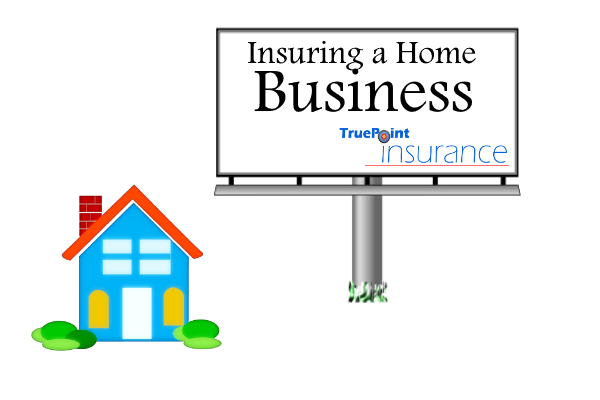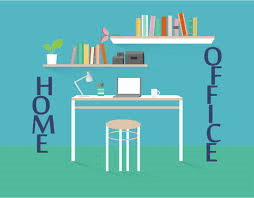Homeowner (HO) policies aren’t meant to insure businesses that are run out of a home. Premiums paid for homeowner’s coverage are for handling losses related to the ownership and use of a residence and related structures. Therefore no liability coverage is available for business activities such as customers who slip and fall on your premises, damage to business property (owned or in your control), injury caused by things you make (product liability), or damage due to services that you promote or provide. It is also unlikely that an insurer would provide a legal defense against business-related claims.

Generally, an HO policy does not provide workers compensation coverage for any employee. Medical expense and liability coverage may be available for workers who are ineligible for worker’s compensation, such as maids, butlers, or nannies, but such coverage only applies if an injury occurs while performing residential tasks.
Example: You send your nanny to deliver copies of your business proposal and, on the way to the client, she is seriously injured in a fall. Your policy won’t provide any medical expense coverage for your nanny because she was performing a business-related chore.
There is no coverage for detached garages, barns, or similar structures on your residence premises if they are used in whole or part for the business.
Example: You store $3,000 worth of equipment and supplies that you use in your job in your garage and the garage burns down. The fire loss to the garage becomes ineligible because of its partial business use.
A basic HO policy may protect certain property. However, the coverage may be limited to as little as a few hundred dollars. Items qualifying for limited coverage include business personal property kept in or around your home, business personal property kept at a location other than in or around your home or landlord’s furnishings. One way to improve your coverage is to add policy options that do the following:
- increase the coverage limits for business personal property
- cover garages and other buildings that are rented to others
- protect electronic business equipment which is usually used in a vehicle while such equipment is located outside of a vehicle
- provide theft coverage for the landlord’s property
- acquire limited business personal property and liability coverage for an in-home daycare
- cover a condo unit owners’ liability for damage caused by renters
- provide premises liability coverage (i.e. a customer slips and falls)
A variety of businesses are routinely operated in homes. This article discusses aspects of particular operations. Refer to part one for background information on coverage basics as well as our other parts discussing different businesses.
Sales Office

Usually, an HO policy does not offer much protection for business property. In fact, available coverage may be up to only $2,500 for personal property used for business and kept on the residence premises. Further, no coverage applies to a business property such as inventory, product samples, or items being held for delivery. Finally, even optional coverage excludes property related to a business conducted on the premises. For example, you are a cosmetic sales rep who also holds make-up parties in your home. For customer convenience, you keep an inventory of cosmetics at home. The HO policy will not cover this property.
If you are a salesperson operating out of your home and have limited inventory, some companies will cover you with a Businessowners Policy (BOP). A BOP provides broad coverages for buildings, personal property, loss of business income and extra expense incurred to remain in business (after a fire or other covered cause of loss), premises liability and medical payments. If you have more than $1,000 of goods off-premises in transit, you will need to add additional coverage. Goods stored at other locations must be added to the policy.
If you cannot qualify for a BOP and a home business endorsement or separate policy fails to meet your needs, your agent will probably have to build a special commercial package policy to handle your business. Commercial lines agents have both the expertise to design the appropriate coverage and access to the markets that offer policies for your sales business.
In part one of this article, we discussed what coverage issues must be considered when running a sales office out of a home. Besides the protection previously mentioned, you will need workers compensation coverage for any employees, even part-timers, and, if you deliver anything or if your vehicle is larger than a car, van or small pickup, you may need commercial automobile insurance. Another reason for buying a commercial auto policy is if any auto is corporately owned.
Professional Offices

Regarding doctors, attorneys, architects or similar occupations, whether your home office is your only office or simply a satellite office, you will need to work with an insurance agent who is familiar with the coverages that are appropriate for professionals.
BOPs are suitable for most professional offices and can cover buildings, personal property, loss of business income, extra expenses incurred to operate the business (after a fire or other covered cause of loss), premises liability and medical payments.
Consult with your agent or your professional association(s) for professional liability and errors and omissions coverage.
COPYRIGHT: Insurance Publishing Plus, Inc. 2016
All rights reserved. Production or distribution, whether in whole or in part, in any form of media or language; and no matter what country, state or territory, is expressly forbidden without written consent of Insurance Publishing Plus, Inc.

 Contact
Contact
 Email an Agent
Email an Agent

 Click to Call
Click to Call Get Directions
Get Directions


